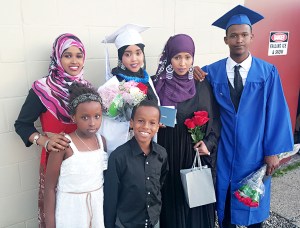LEWISTON — Three years ago, Nuuro Hassan, 19, and her brother, Hassan Hassan, 18, arrived in Lewiston from Kenya. They spoke no English.
Despite the language obstacle, on June 10 they were among 215 Lewiston High School graduates in the Class of 2016.
Both graduated in three years. Of the 70 English Language Learners who graduated this year, the brother and sister were among six who completed high school in three years.
“Both did very well,” said ELL teacher Patty MacKinnon. “They’re inspiring, the hardest working students I’ve ever met. They have a special gift for languages.”
During their first year at LHS, the siblings were learning English in self-contained English Language Learner classes.
Being in class and not knowing what was being said was difficult and frustrating at times, Nuuro said. Facial expressions helped. “The eyes,” she said. “When I first came here the teacher was very good. She explained.”
New students who don’t speak the language are taught with visuals, expressions and the immersion experience. They also are helped by ed techs who speak Somali. “And students here translate to each other,” MacKinnon said. “It’s incredible how this population helps each other so much.”
Learning English became her focus, Nuuro said.
“I asked Ms. MacKinnon to give me extra work so I can learn the language,” Nuuro said. “She gave me extra work. Even if I didn’t get an A, I always asked my teachers, ‘Can you give me extra work?’”
In addition to schoolwork, she learned through English conversations with other immigrant students and by watching television and movies.
The siblings both attended summer school. During their second year, Nuuro said she understood her ELL classes counted as only elective credit. “I decided to take more classes. I decided, ‘I can do it.’ You can’t do anything unless you make up your mind.”
In his second and third years, Hassan also took extra courses, including a lot of math: algebra, geometry, pre-calculus. Math is an international subject, the same in any language, he said. “It was easy for me.”
Both got high grades.
The third year, “I decided I could graduate” in three years, she said. “I talked to the principal asking, ‘Can I do this?’ I said I don’t want to come back a year for only two classes. He said, ‘I want to see your grades first.’”
Her high school experience didn’t involve much socializing. “When they’re doing fun things, I always say no. I’m not going to do it. I’d go to a quiet place and do my work. I don’t want to waste one minute.”
MacKinnon recalled when the class watched a movie, Nuuro went outside and worked on an essay. She and her brother stayed after school every day for extra help.
It was important, Nuuro said, to get good grades and set the right path for her future.
“If I give up in high school and didn’t do good work, I’m not going to do better when I grow up,” she said. “So I decided to always try and work hard.”
This year, Nuuro’s courses included junior English, senior English, government, U.S. history, photography, algebra, biology and chemistry.
Hassan’s courses included junior English, senior English, chemistry, physics, gym, support study and early college classes. He was also a member of the championship soccer team.
She’s planning to go to Central Maine Community College and get a medical assistant degree, then a bachelor’s degree. She wants to become a nurse.
He’s also attending CMCC this fall. “I have a family here that needs help,” he said. “My dad died in Somalia. My mom has 10 kids. I don’t want to go far from here.”
He plans a career in one of three areas: electricity, engineering or computer science. “I feel like I’m good in math,” he said. After CMCC he plans to get a bachelor’s degree and get “a good job to help my family.”
Before they came to the United States, they lived most of their lives in Somalia, then two years in a refugee camp in Kenya. They studied in both countries, but education is a luxury there.
“In Africa it’s not easy to get an education,” Hassan said. “You have to pay. It’s not like here.”
And Somalia wasn’t safe. “There was a lot of war,” he said. “When you hear guns you have to go to someplace safe.”
“Sometimes while my friend and I played outside, the war started,” she said. “I saw a lot of people dying in front of me.” They lost family and friends from the violence, Nuuro said.
Other times eating dinner with family “you hear bombs,” Nuuro said. “You don’t know which way to run. You see a lot of people running on the street.” There are a lot of “bad guys,” she said.
Today their lives are better, she said.
“Now I have an education,” she said a few days before graduation, her cap and gown in her lap. “I believe without an education you’re not going to move on in life. When you have an education you can do whatever you want. Good things.”

Comments are no longer available on this story